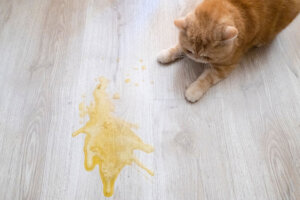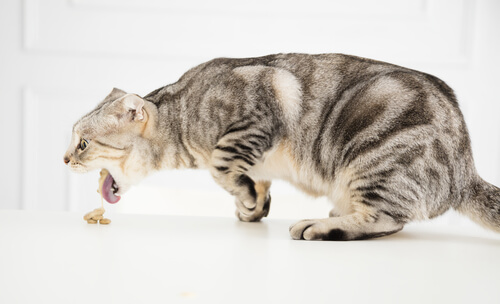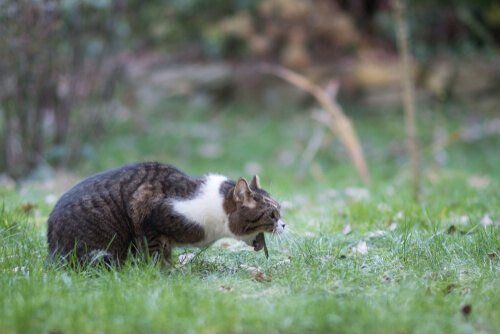Does Your Cat Vomit After Eating?


Reviewed and approved by the veterinarian and zootechnician Sebastian Ramirez Ocampo
Nothing worries a guardian more than seeing their cat vomit, especially after eating. There are many possibilities that come to mind, among them that they don’t like their food, the food didn’t agree with them, or they’re ill.
What is certain is that one of the above has occurred, and you’ll need to find out why. Let’s go deeper into this topic.
Cat vomit or regurgitation? It isn’t the same
Before deciphering the reasons behind your cat vomiting, it’s good to learn to differentiate between vomiting and regurgitation. Although it’s believed they’re the same, the truth is that they aren’t.
On the one hand, vomiting involves a greater effort in the act itself, as well as strong movements of the abdomen to expel the stomach contents, added to the act of stretching the neck and emitting retching sounds. After all this, expulsion takes place. In the meantime, regurgitation is effortless.
Vomiting is classified as acute when it’s frequent within a short period of time or chronic when it’s sporadic. Despite being different, when either of the two occurs in your cat, it’s necessary to go to the veterinarian. Behind this situation, there can be serious diseases such as intestinal inflammations, tumors, hairballs, ulcers, and even foreign bodies. Therefore, it shouldn’t be treated as something minor.
Why does your cat vomit its food? We tell you!

Cats groom themselves all the time and if they do not eat cookies or products that help them digest the hairs, they could vomit their food. In this case, they aren’t throwing up their food as such, but the hairballs that start to accumulate.
Brushing your felines continuously, as well as increasing the fiber in their diet, perhaps with malt, is a good idea to help them avoid hairball formation. Now, this isn’t the only reason, we’ll tell you more.
Cat vomits undigested food
If your cat vomits after eating, leaving its undigested food visible, you have to notice whether they do its it immediately after eating or if they let a few minutes go by.
- Vomiting after eating (immediately or 30 minutes later): This could indicate gastritis, which can be chronic or acute.
- A couple of hours after feeding: This could be an obstruction, pancreatitis, or digestive function problems.
1. Cat vomiting, a sign of gastritis
As mentioned before, when a cat vomits its undigested food, it could be a sign of gastritis or chronic inflammatory bowel disease. It turns out that this is more common than it should be in cats and isn’t always related to food as such. When it occurs, the pet may or may not vomit digested food.
The causes of gastritis in cats are many and, like vomiting, it can be chronic or acute. The veterinarian will be the one to give the diagnosis and send treatment, which must be followed to the letter to work well.

2. Vomiting due to overeating
Some cats vomit their food after eating because they have overeaten or eaten too fast, i.e. too much food in a short period of time. Thus, they overload their stomach and are forced to bring up the food without even digesting it.
When your cat vomits for this reason try some different methods. First, you should feed them a smaller amount of food, several times a day, until they meet their daily quota. Second, buy an interactive feeder that prevents the cat from consuming too much food.
In any case, talk to your veterinarian because behind this behavior there may be anxiety, excess weight and food obsession, disorders that you must deal with to eliminate this bad practice.
3. Vomiting caused by gastric retention syndrome
One of the most serious problems to identify when a cat vomits its food is gastric retention syndrome. When this occurs, the cat vomits the feed without digesting it, several hours after consuming it, and they even expel their gastric juice.
This occurs because the stomach isn’t able to function at a proper or normal rate; therefore, it doesn’t empty as it should, thus making them vomit.
The causes behind this syndrome are an injury or a motor disorder, as well as hairballs. As in the other cases, it will be your veterinarian who’ll make the diagnosis and send treatment, as well as specific dietary recommendations. If the condition is severe, surgical intervention may be necessary.
Nothing worries a guardian more than seeing their cat vomit, especially after eating. There are many possibilities that come to mind, among them that they don’t like their food, the food didn’t agree with them, or they’re ill.
What is certain is that one of the above has occurred, and you’ll need to find out why. Let’s go deeper into this topic.
Cat vomit or regurgitation? It isn’t the same
Before deciphering the reasons behind your cat vomiting, it’s good to learn to differentiate between vomiting and regurgitation. Although it’s believed they’re the same, the truth is that they aren’t.
On the one hand, vomiting involves a greater effort in the act itself, as well as strong movements of the abdomen to expel the stomach contents, added to the act of stretching the neck and emitting retching sounds. After all this, expulsion takes place. In the meantime, regurgitation is effortless.
Vomiting is classified as acute when it’s frequent within a short period of time or chronic when it’s sporadic. Despite being different, when either of the two occurs in your cat, it’s necessary to go to the veterinarian. Behind this situation, there can be serious diseases such as intestinal inflammations, tumors, hairballs, ulcers, and even foreign bodies. Therefore, it shouldn’t be treated as something minor.
Why does your cat vomit its food? We tell you!

Cats groom themselves all the time and if they do not eat cookies or products that help them digest the hairs, they could vomit their food. In this case, they aren’t throwing up their food as such, but the hairballs that start to accumulate.
Brushing your felines continuously, as well as increasing the fiber in their diet, perhaps with malt, is a good idea to help them avoid hairball formation. Now, this isn’t the only reason, we’ll tell you more.
Cat vomits undigested food
If your cat vomits after eating, leaving its undigested food visible, you have to notice whether they do its it immediately after eating or if they let a few minutes go by.
- Vomiting after eating (immediately or 30 minutes later): This could indicate gastritis, which can be chronic or acute.
- A couple of hours after feeding: This could be an obstruction, pancreatitis, or digestive function problems.
1. Cat vomiting, a sign of gastritis
As mentioned before, when a cat vomits its undigested food, it could be a sign of gastritis or chronic inflammatory bowel disease. It turns out that this is more common than it should be in cats and isn’t always related to food as such. When it occurs, the pet may or may not vomit digested food.
The causes of gastritis in cats are many and, like vomiting, it can be chronic or acute. The veterinarian will be the one to give the diagnosis and send treatment, which must be followed to the letter to work well.

2. Vomiting due to overeating
Some cats vomit their food after eating because they have overeaten or eaten too fast, i.e. too much food in a short period of time. Thus, they overload their stomach and are forced to bring up the food without even digesting it.
When your cat vomits for this reason try some different methods. First, you should feed them a smaller amount of food, several times a day, until they meet their daily quota. Second, buy an interactive feeder that prevents the cat from consuming too much food.
In any case, talk to your veterinarian because behind this behavior there may be anxiety, excess weight and food obsession, disorders that you must deal with to eliminate this bad practice.
3. Vomiting caused by gastric retention syndrome
One of the most serious problems to identify when a cat vomits its food is gastric retention syndrome. When this occurs, the cat vomits the feed without digesting it, several hours after consuming it, and they even expel their gastric juice.
This occurs because the stomach isn’t able to function at a proper or normal rate; therefore, it doesn’t empty as it should, thus making them vomit.
The causes behind this syndrome are an injury or a motor disorder, as well as hairballs. As in the other cases, it will be your veterinarian who’ll make the diagnosis and send treatment, as well as specific dietary recommendations. If the condition is severe, surgical intervention may be necessary.
All cited sources were thoroughly reviewed by our team to ensure their quality, reliability, currency, and validity. The bibliography of this article was considered reliable and of academic or scientific accuracy.
- Jergens, A. E., & Simpson, K. W. (2012). Inflammatory bowel disease in veterinary medicine. Frontiers in Bioscience-Elite, 4(4), 1404-1419.
- Gastritis in cats, VCA Hospitals. Recogido a 20 de octubre en https://vcahospitals.com/know-your-pet/gastritis-in-cats
- Long-Term Stomach Inflammation in Cats, PETMD. Recogido a 20 de octubre en https://www.petmd.com/cat/conditions/digestive/c_ct_chronic_gastritis
- Ansiedad felina, gattos.net. Recogido a 10 de junio en https://www.gattos.net/images/Publicaciones/Vanesa/ARTICULOANSIEDADFELINA.pdf
- Hernández, C. A. (2014). Emergencias gastrointestinales en perros y gatos. Revista CES Medicina Veterinaria y Zootecnia. https://doi.org/10.21615/1030
- Pibot, P., Biourge, V., & Elliott, D. (2010). Enciclopedia De La Nutrición Clinica Felina. Royal Canin. https://vetacademy.royalcanin.es/enciclopedia-de-la-nutricion-felina/
This text is provided for informational purposes only and does not replace consultation with a professional. If in doubt, consult your specialist.








